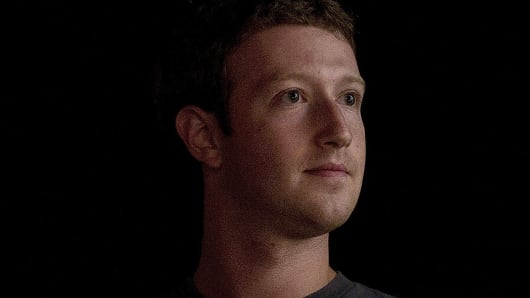If you believe in data, you believe in Facebook.
Add up the active users on Twitter (200 million), LinkedIn (160 million), Facebook-owned Instagram (100 million), and Tumblr (70 million). The result is about half of Facebook's billion-plus active users, which is up 25 percent from a year ago. Engagement across Facebook is also up 50 percent.
(Read More: Feeling Aggressive? Maybe It's Time to Look at Facebook )
Teens choose those other "cooler" platforms specifically because they're small, closed and welcome anonymity. Facebook wants nothing to do with that — it succeeds because of its size, transparency and real identities. Facebook is the only social graph. It connects the free world, and maps to real life.
Today, real life means mobile. We consume more media on smartphones than computers and tablets combined. We spend 82 percent of our mobile media time in apps, and Facebook accounts for 23 percent of that in-app time. In short: apps are the mobile web, and Facebook is the most used app in the world.
(Read More: FTC Eyes Mobile, Social Media With Latest Online Ad Rules )
As a result, Facebook is the only scalable mobile display advertising option. Facebook accesses 76 percent of all smartphone users, and is making $4 million per day on mobile native ads, a product that didn't exist when Facebook went public less than a year ago.
Facebook's native ads are so successful because the advertising paradigm has been turned upside-down. In print, digital and TV, brands have always paid to disrupt entertaining content with ads. On Facebook, brands create the entertaining content and pay to make sure that the right people see it.
As Facebook begins to roll out the interest-based Newsfeed that it announced last week, brands' ability to target content will improve. Ads related to the next Hunger Games film, for example, will be shown to people scrolling through the movie feed who have marked it "Want to Watch."
(Read More: In News Feed Revamp, Facebook Creates 'Personalized Newspaper' )
The great thing about the new Newsfeed is that it improves the user experience, while optimizing the advertising experience. Simultaneously providing value to users and advertisers is the brilliance of Facebook in a nutshell.
This year, Facebook is making that value to advertisers easily measurable.
Between conversion pixels and database partnerships, companies can begin to track the purchases made online and offline by people who saw or engaged with their native ads.
Does that make you worry about privacy? Sorry, privacy is dead. Now, Facebook is privacy. It's your digital ID card, verifying who's who on the web and providing identity security. Already, it lets you shop securely by typing Sold in a comment on a brand's product photo in order to buy it.
(Read More: Why Online Privacy Is a Big Oxymoron )
I bet that's only the beginning for Facebook's social commerce ambitions, and many other Facebook features, like Gifts and Graph Search and social TV.
People like to hate what they love. We're hearing constant stories of Apple's demise even though it reported a record-breaking quarterly profit of $13 billion. And we witnessed LeBron's vilification after The Decision, only for him to have the best-selling jersey in the NBA by Christmas that year.
Facebook is Apple and Facebook is LeBron. You might say it sucks, but your data tells another story.
Jason Stein is the founder and president of social media agency Laundry Service, and a partner in Windforce Ventures, a VC firm focused on social and mobile. Stein owns shares of Facebook. Tweet him @jasonwstein.



